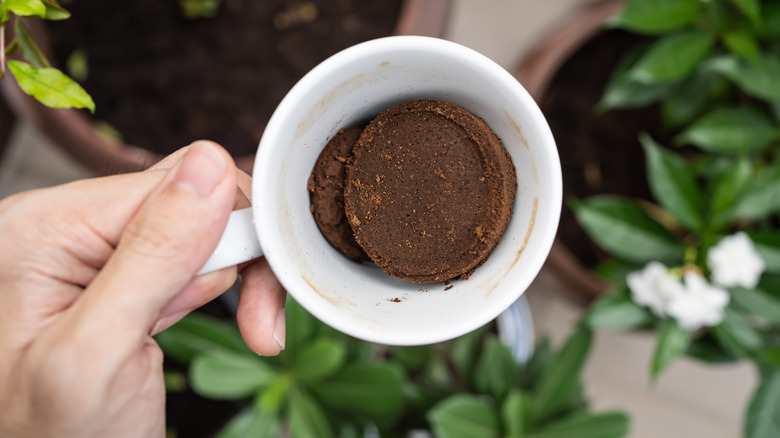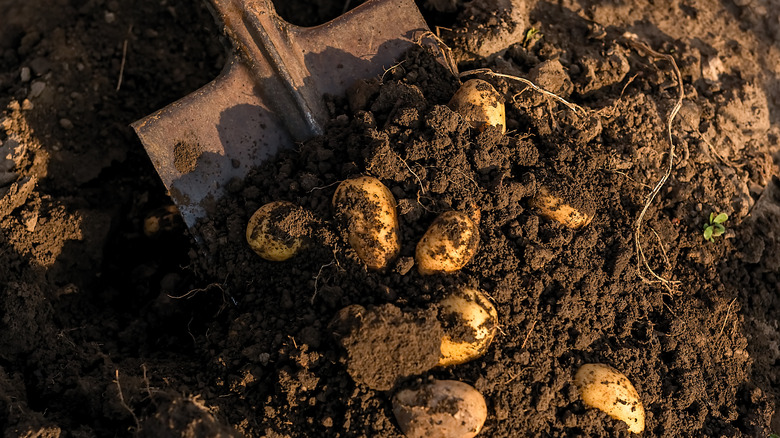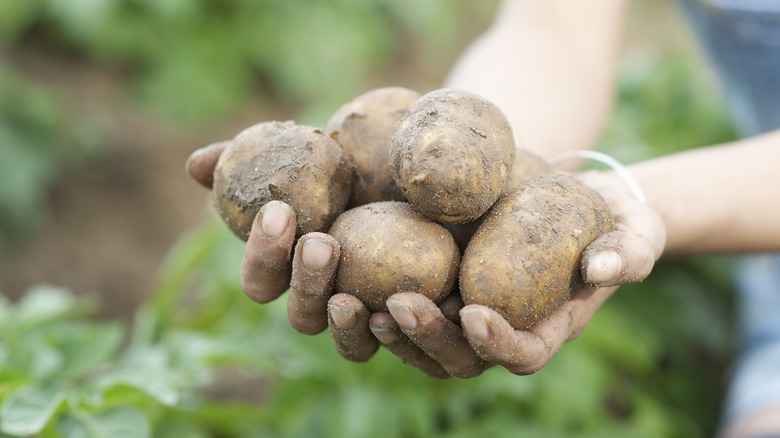Think Twice Before Using Coffee Grounds In The Soil Around Your Potatoes
A large part of gardening involves maintaining healthy soil for your plants. In an effort to achieve this, you may have come across several natural methods that promise results while also saving you money. One such method is applying used coffee grounds. This method purportedly works by increasing soil acidity, and proponents encourage gardeners to add either used or leftover coffee grounds by mixing them directly into garden soil. Among some of the other purported benefits include getter growth, reduced risk of plant disease, and fewer pests.
However, it's important to avoid common rookie mistakes when using coffee grounds in the garden. For one, coffee grounds don't guarantee healthy plant growth alone, and this hack might not be useful for all plants in your garden. Potatoes are among the plants that may not necessarily benefit from used coffee grounds in the soil. According to the University of Georgia Extension, potatoes require moderate acidity in their soil, around 4.8 to 5.4 pH. While coffee itself is acidic, used coffee grounds have lower acidity due to losses from prior brewing processes.
Why the used coffee hack may not guarantee potato plant growth
At the core of the used coffee hack is the premise that you might be able to increase the acidity of soil in your garden. There are a couple of issues with this theory. First, potatoes don't require a lot of acidity in order to grow, so trying to make the soil more acidic might not produce the results you're looking for. Also, used coffee grounds aren't that acidic to begin with. The University of Wyoming Extension estimates that their pH is around 5.5 to 6.8. For this reason, it's unclear whether potato plant soil could benefit from any purported acidity.
Still, there may be other possible benefits of coffee grounds for potato plant growth. Even if your potatoes don't necessarily benefit from any supposed acidity boost, coffee grounds may still provide essential nutrients when you add them to your soil. Among these include nitrogen, phosphorus, magnesium, and more. If you do add coffee grounds to potato plant soil, it's important to mix them in thoroughly, and to measure the pH of your soil ensure it maintains the ideal 4.8 to 5.4 level.
Other ways to support potato growth in your garden
While you shouldn't rely on used coffee grounds as a way to increase soil acidity for potatoes, there may be other possible benefits of coffee in your garden. For example, the substance may possibly help other plants, such as fruit trees, tomatoes, and blueberries.
If you're looking for other methods to ensure your potato plants grow well in your garden, there are some other rules to help make this happen. First, potatoes tend to thrive best in loose soil with high drainage, rather than compact and wet versions. For this reason, you might consider planting potatoes in raised beds. Potato plants do best when grown 15 inches apart from each other — inadequate spacing is a common gardening mistake people make when growing potatoes. They also need plenty of sun and adequate water to produce the best-tasting tubers possible. The University of Georgia Extension recommends basing your irrigation schedule on the soil type to ensure that it never dries out.


